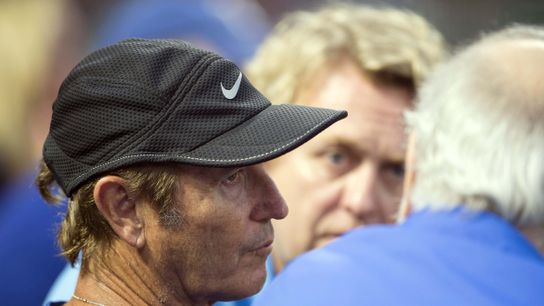The NCAA, at long last, on Wednesday announced the result of its years-long infractions investigation into Baylor football, stemming from the sexual assault crisis during the Art Briles years.
The end result was... a resounding thud. Dave Aranda's program will endure recruiting restrictions and probations for the next handful of years, but Briles and all but one staff member are free to pursue coaching careers at NCAA institutions.
The NCAA did not rule on the most serious allegations, even though it noted the school admitted to "moral and ethical failings" for two largely two reasons, neither of which are exculpatory for the former Baylor staff:
1) The reporting and enforcement process across Baylor University was so poor at that time that failing to report allegations against Bears football players technically did not constitute an impermissible benefit because their peers in the student body at large enjoyed the same "benefit."
2) The accusations are so serious that they're well beyond the scope of what the NCAA rule book was designed to prosecute. "A lot of these things that we're talking about, they're not NCAA rules violations," one infractions committee member said. "They're felonies."
Putting this in as plain English as I can: Baylor wasn't punished for failing to report alleged rapes, they were punished for playing players that cheated on their coursework and for not properly running their football-recruiting student organization.
The panel didn't rule on Briles specifically because the accusations against him were so beyond the norm that they felt out of their depth ruling without input from membership at large.
And yet that's not what the Briles camp took from Wednesday's announcement. Within an hour of the news dropping, Briles's attorney Scott Tompsett released a statement claiming his client has been "completely exonerated."
While he is technically clear to return to coaching college football, it is not accurate to say he was completely exonerated.
On Pages 34 and 35 of the 125-page report, the panel took multiple paragraphs to weigh Briles's culpability and explain why he was not placed with a show-cause. The panel found his "incurious attitude toward potential criminal conduct" to be "deeply troubling" and said he "failed to meet even the most basic expectations of how a person should react to the kind of conduct at issue in this case."
The panel also considered whether the head coach's own conduct—not the conduct of his staff—demonstrated that he failed to meet his responsibilities as a head coach. In particular, the panel gave careful scrutiny to the head coach's handling of the specific instances of alleged sexual assault, interpersonal violence and threats of violence that are at the center of this case. In each instance, when the head coach received information from a staff member regarding potential criminal conduct by a football student-athlete, he did not report the information and did not personally look any further into the matter. He generally relied on the information provided to him by his staff and likewise relied on them to handle problems. His incurious attitude toward potential criminal conduct by his student-athletes was deeply troubling to the panel. As one panel member observed at the hearing when questioning "a lot of these things that we're talking about, they're not NCAA rules violations . . . [or] university policy violations. They're felonies. [W]e're talking about rapes and physical assaults."
The head coach failed to meet even the most basic expectations of how a person should react to the kind of conduct at issue in this case. Furthermore, as a campus leader, the head coach is held to an even higher standard. He completely failed to meet this standard. However, there is no linkage between this conduct and Level I or II NCAA violations. The COI has never before concluded that a head coach responsibility violation occurred where there were no underlying NCAA violations. The panel makes no determination as to whether such an allegation or conclusion would be appropriate in a future case. But under the specific facts and circumstances of this case, the panel does not conclude that a head coach responsibility violation occurred.
Briles's wasn't cleared because the panel felt he didn't do anything wrong, he was cleared because it didn't feel comfortable, as a group that levies punishments for breaking silly sports rules that ultimately matter very little in the grand scheme of life, it didn't feel comfortable ruling on his actions in reporting alleged felonies.
Whether or not Briles wants to come back is largely a moot point. He's now 65 years old and hasn't coached since 2015. While the NCAA infractions committee could not place a formal roadblock in front of any university's attempt to hire him, the committee made sure to lay enough barbed wire and land mines so as to make even the slightest attempt at a pursuit not worth the effort to any AD or university president.
